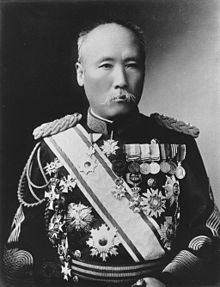Fukushima Yasumasa
| Baron Fukushima Yasumasa | |
|---|---|

Viscount Fukushima Yasumasa
|
|
| Born |
May 27, 1852 Matsumoto, Shinano Province, Japan |
| Died | February 19, 1919 (aged 66) Tokyo, Japan |
| Allegiance | Empire of Japan |
| Service/branch |
|
| Years of service | 1874-1908 |
| Rank | General |
| Battles/wars |
Satsuma Rebellion First Sino-Japanese War Boxer Rebellion Russo-Japanese War |
| Awards | Knight-Commander of the Order of the Bath |
Fukushima Yasumasa (福島 安正?, 27 May 1852 – 19 February 1919) was a general in the Imperial Japanese Army.
Fukushima was born to a samurai family; his father was a retainer to the daimyō of Matsumoto, in Shinano Province (modern Nagano Prefecture). He came to Edo (later Tokyo) to attend the Kobusho military school for hatamoto located in Tsukiji. After graduating the school in 1874, he joined the Ministry of Justice as a civilian personnel and later moved to the Ministry of War. He participated in the government forces in the Satsuma Rebellion. His quick mind and ability to get along well with people earned him a posting at the Imperial Japanese Army General Staff at an early age.
During the next years, he traveled extensively, visiting Mongolia in 1879, serving as military attaché to Beijing from 1882-1884. He was a staff officer of the Japanese First Army when the First Sino-Japanese War broke out.
After the war, Fukushima visited British India and Burma on an extensive tour from 1886-1887. In 1887, he was promoted to major, and sent as military attaché to Berlin. On this trip in 1892, he was accompanied by Prince Saionji Kinmochi. Fukushima, who spoke 10 languages fluently, was a popular figure in German society during his stay in Berlin. Fukushima made a reputation during his stay in Berlin, for winning all manner of wagers involving feats of arms or physical strength. He later claimed that the reason for his long ride across Russia was a wager made over drinks against some German cavalry majors. (The story is probably an invention, as some historians claim that Fukushima never drank alcohol, and in any case it is not recorded whether or not Fukushima ever collected on the wager). In any case, Fukushima was an admirer of Colonel Burnaby, a British cavalry officer, who had made an epic ride to Khiva in 1874 after receiving word that the Russians had closed the border to Turkistan. Fukushima also shared Burnaby's political views that Russia was the chief enemy of both Great Britain and Japan.
...
Wikipedia
